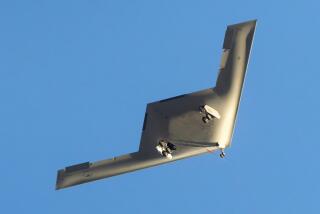Cheney Defends Cost of Stealth Bomber : Cites History in Justifying Price to Stunned Panel
- Share via
WASHINGTON — Defense Secretary Dick Cheney defended the embattled B-2 Stealth bomber today and chided House members for protesting its price tag now after a decade of support for the radar-evading plane.
“I recognize the sticker shock,” Cheney told the House Armed Services Committee, referring to the $70-billion program for 132 bombers at $530 million each.
“If you look at it in historical perspective, it’s not that unreasonable,” he added, saying the program will consume a smaller percentage of the defense budget than either the B-52 or the B-1B bombers.
Cheney, who took over at the Pentagon in April after serving in the House for a decade, noted that the committee and the Congress for a decade has been approving money for the B-2, a program that has now consumed $23 billion, with one plane on the runway for testing, five more at various stages of production and five more approved and paid for.
“This committee . . .is probably more responsible for the B-2 program in its current state than I am,” Cheney said. “We can afford it. Let’s go for it.”
And, he said, if Congress does not want the bomber, it should kill the program outright. “You shouldn’t nickel and dime it to death. You have to make that choice.”
Cheney was confronted by senior committee members--Chairman Les Aspin (D-Wis.) and ranking Republican Bill Dickinson of Alabama--over the $7 billion to $8 billion a year the program seeks in the early 1990s, and the near political impossibility of spending that much on one weapon system in a single year.
Technology problems, Dickinson said, are not the stumbling block.
“The big problem with B-2 is the total cost,” he said, noting that program details were secret for so long that when cost details were declassified in recent months “most members were aghast. . . . I’m telling you, I do not believe Congress is going to fund that at $6, $7, $8 billion a year for three or four years.”
“If Congress doesn’t fund it, we won’t buy it,” said Cheney, who strenuously argued the plane’s virtues in being able to slip past Soviet air defense radars, on which Moscow has invested $320 billion, to reach its targets.
In response to Cheney’s assertion that members had approved of the program over the years, Aspin said, “The record’s replete with examples of ‘this isn’t going to fly’ financially.”
Cheney argued that the price tag “is not out of line, given what we’ve paid for other programs.”
More to Read
Sign up for Essential California
The most important California stories and recommendations in your inbox every morning.
You may occasionally receive promotional content from the Los Angeles Times.













